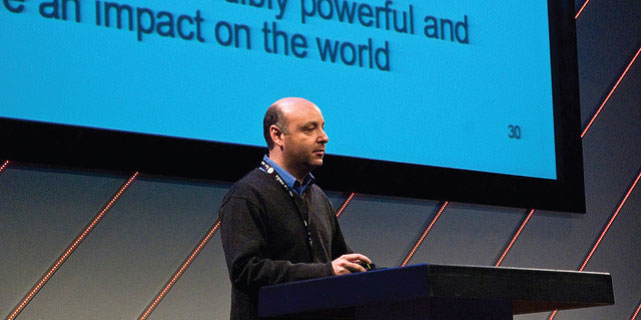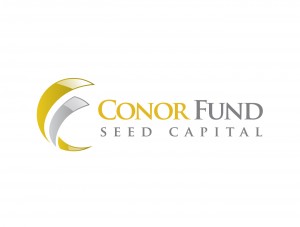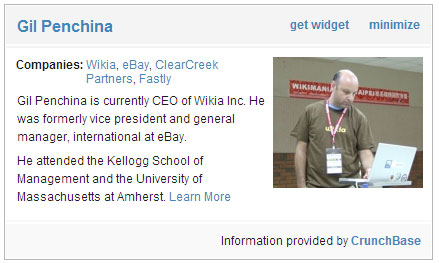 [column col=”1/2″]Az egyik legjobb dolog a hiper-sebességű startup iparágban, hogy a legendák közöttünk járnak. A tech csillagokkal néha egészen hétköznapi szituációkban lehet találkozni Palo Alto kávézóiban, éttermeiben, de kis szerencsével nagyobb konferenciákon is el lehet velük beszélgetni – egy-két percnél persze nem többet, mert ebben a világban mindenkinek az ideje a legdrágább. Olyan viszont felettébb ritkán történik, hogy egy igazi Legenda eljön ide Magyarországra. Gerő Viktor meghívására és a Conor Fund-nak (a Central befektetői csoport része) köszönhetően azonban hamarosan Magyarországra érkezik Gil Penchina, aki üzleti angyalként olyan cégeknek írta meg az első csekkeket, mint a LinkedIn, a PayPal, az IndieGoGo vagy a Couchsurfing, és aki közel 2 évig irányította az eBay európai terjeszkedését. Gil jelenleg is több mázlis startup befektetője, és május 2-án a Budapest Barcamp-en élőben is találkozhattok vele, sőt, egy pár pitch-et is meghallgat, ha már itt van. Igyekeztem mindenki másnál előbb feltenni néhány olyan villámkérdést Gil-nek, amit a magyar startup sajtó szerintem nemigen fog. Ezúton is hálásan köszönöm neki, hogy kötélnek állt az interjúhoz és mindössze pár órán belül válaszolt. Hölgyeim és Uraim, következzen Gil Penchina, a Legendás Angel Investor a megszokott egyből-a-lényegre stílusban:[/column]
[column col=”1/2″]Az egyik legjobb dolog a hiper-sebességű startup iparágban, hogy a legendák közöttünk járnak. A tech csillagokkal néha egészen hétköznapi szituációkban lehet találkozni Palo Alto kávézóiban, éttermeiben, de kis szerencsével nagyobb konferenciákon is el lehet velük beszélgetni – egy-két percnél persze nem többet, mert ebben a világban mindenkinek az ideje a legdrágább. Olyan viszont felettébb ritkán történik, hogy egy igazi Legenda eljön ide Magyarországra. Gerő Viktor meghívására és a Conor Fund-nak (a Central befektetői csoport része) köszönhetően azonban hamarosan Magyarországra érkezik Gil Penchina, aki üzleti angyalként olyan cégeknek írta meg az első csekkeket, mint a LinkedIn, a PayPal, az IndieGoGo vagy a Couchsurfing, és aki közel 2 évig irányította az eBay európai terjeszkedését. Gil jelenleg is több mázlis startup befektetője, és május 2-án a Budapest Barcamp-en élőben is találkozhattok vele, sőt, egy pár pitch-et is meghallgat, ha már itt van. Igyekeztem mindenki másnál előbb feltenni néhány olyan villámkérdést Gil-nek, amit a magyar startup sajtó szerintem nemigen fog. Ezúton is hálásan köszönöm neki, hogy kötélnek állt az interjúhoz és mindössze pár órán belül válaszolt. Hölgyeim és Uraim, következzen Gil Penchina, a Legendás Angel Investor a megszokott egyből-a-lényegre stílusban:[/column]
[column col=”2/2″]One of the best things in the hyper-speed startup industry is that legends are among us. You can meet tech stars in fairly common situations in coffees and restaurants of Palo Alto, and also, with a bit of luck you might get hold of not more than a minute or two talking with them, since time is the scarcest resource in this world. However, it happens extremely rarely when a Legend happens to visit Hungary. Invited by Viktor Gerő and sponsored by Conor Fund (Part of the Central Investment Group) the man who have written the first checks as an angel investor to companies like LinkedIn, PayPal, IndieGoGo and Couchsurfing and worked as a VP and General Manager of eBay for almost two years, Gil Penchina is visiting Hungary soon. Gil is currectly active as an angel investor of some fluker startups and you can personally meet him live on 2nd of May at Budapest Barcamp, moreover, being already here, he’s going to listen to some pitches as well. I intended being faster than anybody else asking a couple of quick questions to Gil, that the rest of the Hungarian Startup press will probably wouldn’t. Hereby I’d like to express my gratefulness to him, for fulfilling my request, and answering in just a couple of hours. Ladies and Gentleman, here comes the Legendary Angel Investor, Gil Penchina, in the usual get-down-to-business style:[/column]
[divider scroll_text=”SCROLL_TEXT”]
[column col=”1/2″]Mi izgatott legjobban a LinkedIn-ben és a Yelp-ben, amiért befektettél?
GP: A LinkedIn-ben üzleti angyal voltam. Lényegében sokkal inkább Reid Hoffman-ba fektettem, mint a közösségi hálózatba és a célpiacot (szakemberek) egy jelentős értékkel bíró közönségnek éreztem. Nem hiszem, hogy bárki is gondolta volna, hogy olyna nagyra nő, mint amilyen ma. Ez Reid érdeme. A Yelp esetében az európai verzióba, a qype.de oldalba fektettem be, amit a Yelp felvásárolt. Amikor a qype.de-be invesztáltam, akkor már világosan látszott, hogy a Yelp nagy üzlet.
Mark Suster híres blog posztja szerint az üzleti angyalok és a kockázati tőkések vonalakba fektetnek, nem pontokba. Mennyi ideig kell egy startupnak a radarod képernyőjén lennie ahhoz, hogy dönteni tudj a befektetésről?
GP:A mai AWS világban (Amazon Web Services) sokkal inkább az adatba (vagyis felhasználói trendekbe) fektetek, mint sztorikba. Ezért elég gyorsan tudok dönteni ha az adat imponzáns számomra (napok, vagy hetek alatt).
Mit keresel elsősorban a csapatokban? A Hacker-t vagy a Hustlert?
GP:Ideális esetben egyet-egyet mindegyikből. Vagy még inkább 5 Hacker-t…
Mik lennének a legkomolyabb kétségeid, ha találnál egy nem amerikai rocksztár startupot, amelyiket befektetésre érdemesnek találnál?
GP:Hajlandóak az Egyesült Államokba költözni? Globális piacot céloznak? Elég kockázatvállalás van bennük?
Az üzleti angyalok még mindig convertible debt formájában fektetnek be, vagy hajlamosan korán felértékelni a cégeket és olyasmi term sheet-eket használnak, mint a Series Seed Documents? (Mivel ugye convertible debt cap nélkül rossz a befektetőnek, convertible debt cappel rossz az alapítóknak.)
GP:Számomra a convertible debt cap-pel lényegében ugyanaz, mint az equity-jellegű finanszírozás. Mindkettő limitálja a befektető számára a hátrányokat, egyúttal korlázozza az előnyöket. Soha nem fektettem be cap nélkül és mindössze néhány ilyen deal-t láttam a 2011-2012 üzleti angyal lufi során is.
A magyar szabályozás szerint a vesting intézményét szinte képtelenség a kokcázati tőkés megállapodásokba implementálni Magyarországon. Fektetnél valaha olyan magyar cégbe, amely már bevont egy seed nagyságú kockázati tőkét, de nincs vesting a term sheet-jében?
GP:Persze – de találnék valami megoldást arra, hogy az alapítóknak legyen valami vesting-hez hasonló. Feltételezem, egy csomó lehetőség áll a befektetők rendelkezésérer a nem magyarországi ernyő-cégtől kezdve a nagyon nagy option pool-ig hogy olyan convertible debt deal-t kössenek, ami bizonyos részben az alapítók visszatartása (cégnél maradása) alapján konvertálódik a különböző cégértékeléseknél.
Mennyi időt vesz igénybe a befektetéseidnél a szóbeli igentől eljutni az aláírásig és az utalásig?
GP:Néha egy nap, néha egy hónap, megint máskor 6 hónap. Az egész a félelemről és a kapzsiságról szól, valamint a “lökdösődés megindulásáról”.
Hogyan éred el egy Startupnál a Hiper-sebességgű növekedést? (feltételezve, hogy értik a “Könyörtelen Sürgősség lényegét? Gil hírhedté vált kifejezése. Van valami titkos recepted erre?
Képzelj el egy 6 fős csapatot – úgy kiegyensúlyozva, hogy egy varrótű hegyén is megállnának. Az egésznek az a titka, hogy fókuszálj egyetlen egy dologra és ne vacakolj olyan dolgokkal, amiről azt mondták neked, hogy fontos, pedig valójában nem az.
Van olyan startup, amelyiknek nemet mondtál és így visszanézve megbántad a döntést?
GP:Hát, elutasítani a lehetőséget mikor állásinterjúra hívtak a facebook egyik igazgatói posztjára még 2006-ban, így utólag elég költséges döntésnek bizonyult, de nem bánom. Általában a jövőre fókuszálok, és gyorsan feledem a múltat…[/column]
[column col=”2/2″]
What excited you most on investing in LinkedIn and Yelp? How early have you spotted them?
GP: LinkedIn I was an angel in. Ultimately I was investing in Reid Hoffman more than social networking and the target ( professionals) felt like a high value audience. I am not sure anyone thought it could get as big as it has at the time. Reid deserves the credit for that. Yelp- I invested in the European version, qype.de that was bought by yelp. It was clear yelp was a good business by the time I invested in qype.de
According to Mark Suster’s famous blog post, Angels and VCs usually invest in lines, not dots. How long a startup must be on your radar screen to make an investment decision?
GP:In today’s amazon AWS world I invest more in data (user trends) than story. So I can make quick decisions if the data is compelling (days or weeks)
What do you look for in a team? Preferably the Hacker or more the Hustler?
GP:Ideally one of each. Or better yet 5 hackers…
What would be your major concerns if you found a rockstar non-US startup you’d like to invest in?
GP:Will they move to the US ? Are they addressing a global market? Will they take enough risk?
Do angel investors still prefer convertible debt, or they rather tend to value the company early and use term sheets like the Series Seed Documents? (Since convertible debt without a cap is bad for the investor. Convertible debt with a cap is bad for founders.)
GP:To me convertible debt with a cap and equity – are basically the same thing. Both limit downside to investors and cap upside. I’ve never invested in uncapped debt and I only saw a few deals like that during the 2011-2012 angel bubble.
Upon Hungarian regulations, vesting is almost impossible to implement into term sheets in Hungary. Would you ever invest to a Hungarian Company that has raised a seed round but there’s no Vesting in their term sheet at all?
GP:Sure – but I would find a way to make sure the founders have something equivalent to vesting. I imagine there are lots of options from non-Hungarian shell co’s to a large option pool, to investors getting a debt deal that converts based in part on founder retention at different valuations.
How much time does it usually take from your soft circle to the signature of all the documents and writing the check?
GP:Sometimes a day, sometimes a month, sometimes 6 months. It’s all about fear and greed and getting a stampede going.
How do you Hyper-scale a startup (given that they understand „Relentless Urgency”)? Is there any secret technique of yours for that?
GP:Imagine a team of 6 people – all balanced on a single sewing needle. It’s about focus on a single thing and ignoring many other things that you are told are important but really aren’t.
Looking back, is there a startup you passed and regretted the decision later on?
GP:Turning down an opportuity to interview for an executive role at Facebook in 2006 was an expensive decision, but I don’t regret it. I tend to focus on the future and quickly forget the past…
[/column]
[divider scroll_text=”SCROLL_TEXT”]
Gil Penchina hamarosan Magyarországon: BarCamp, 2013. Május 2., Akvárium Klub. Aki bevállal egy pitch-et a LinkedIn angel investorának, az még leadhatja jelentkezését a BarCamp oldalán.
Külön köszönet Molnár Ritának, hogy összehozta ezt az interjút Gil-lel. / Special thanks to Rita Molnár to organize this interview with Gil.
Érdemes követni a Facebook event-et is. És kérek ide is egy lájkot, ha már Gil-t is mertem a Vesting-gel nyaggatni… 🙂




